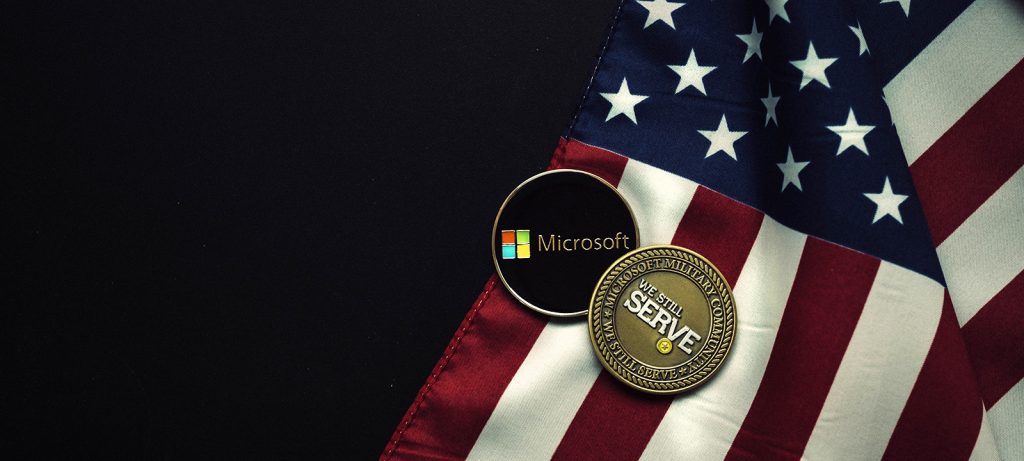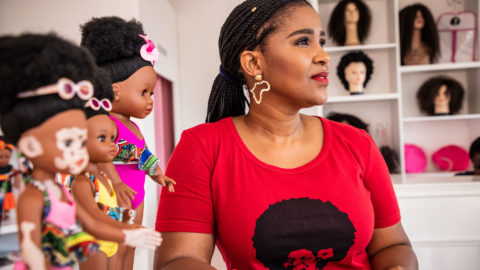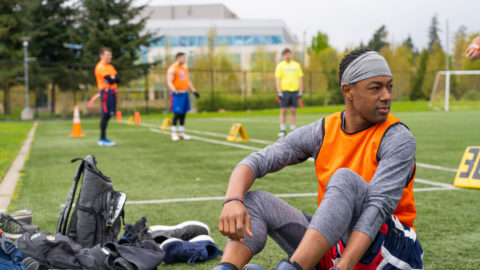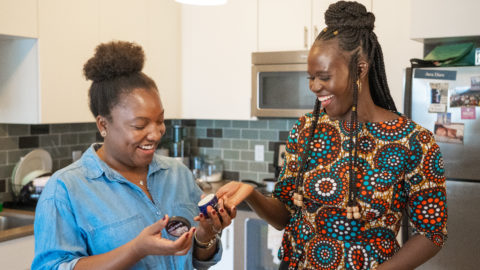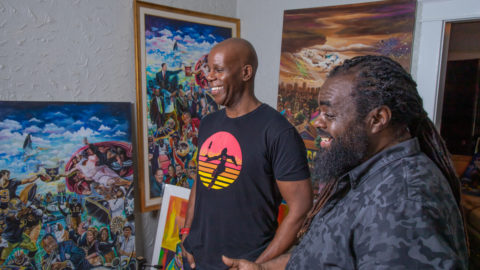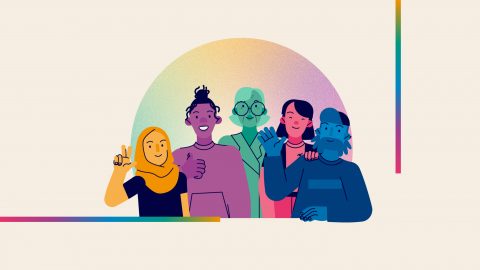Life after the uniform: helping veterans when their tour of duty is complete
Microsoft teams up with other technology companies to help veterans and service members adapt to new lives and address the technical skills gap
It was one of those moments when life seems to both speed up and slow down almost to a standstill. Solaire Brown, suited up in heavy gear, braced herself inside the specialized mine-resistant vehicle where she was training with her fellow US Marines. The vehicles are built to withstand improvised explosive devices and save military lives. But sometimes, when struck, they roll over. The Marine Corps requires extensive training on how to escape if a vehicle flips in an explosion.
Brown and her teammates were in the middle of this training when suddenly, Brown was tossed across the cab as her vehicle spun two and a half times—over, up, over, up, over—and landed upside down. Disoriented Marines hung from their seats. Quickly, they reached around to unclip seatbelts, help each other down, and grab their packs.
Brown exited the vehicle and took her position around the perimeter to complete the training, holding her rifle steady, not noticing the blood running down her face or realizing that the trajectory of her life had just begun to shift.
She soon learned that the impact had caused a concussion and a broken nose and had crushed multiple bones in both of her feet. After two surgeries and a year of rehabilitation, Brown realized that because of her injuries she wasn’t going to be able to maintain the rigorous lifestyle that the Marine Corps requires. She was devastated.
“I loved the Marines, and I wasn’t ready to get out,” Brown said. She’d planned a military career, so after five years in, she felt apprehensive about being without her fellow Marines.
“We trained together, ate together, slept in a pile like a litter of puppies, trying to get even five minutes of sleep between flights to and from deployments or amid missions, ” she said. “They had been my right-hand people for so long that I was sure I’d forget how to operate without them.”
Brown had to figure out what her next step in life would be, without them.
But Marines never get stuck for long. She immediately began to scan the perimeter of her life for other options.
Solaire Brown (formerly Sanderson), who was a Sergeant in the US Marine Corps and is now a security analyst, learned tech skills in Microsoft Software and Systems Academy, which connects veterans to civilian jobs.
Brown is in good company. Nearly 200,000 service members leave active military duty for civilian life every year. Many of them don’t have college degrees and worry that will keep them from building new careers.
“It doesn’t matter if you serve five years or 40 years, transition is tough,” said US Marine Corps Major General Chris Cortez (Ret.), vice president of Military Affairs at Microsoft. “All of a sudden you’ve got to start all over again.”
While the unemployment rate for veterans has been on the decline, some groups of veterans, such as men aged 25 to 34, face higher unemployment rates than their civilian counterparts. Finding a job is a top concern.
Many veterans have found their footing in the civilian work world. But some really struggle, not only with lack of training for another career and little experience looking for work in a competitive environment, but also with overwhelming feelings of isolation, anxiety, pressure, and unfamiliarity.
“In the military, you walk into a room and you look at people in uniform, and you know exactly who they are, and they know exactly who you are,” Cortez said. “But in the industry, it’s much different. There is no uniform.”
In some cases, civilian jobs don’t offer the camaraderie or sense of purpose that drives many veterans. Corporate culture can feel disorienting, where passion isn’t a prerequisite and duty doesn’t drive work hours. And while many veterans yearn to find a new sense of belonging, some say it’s easy to be misunderstood in the civilian work world: coworkers might have no idea what they’ve experienced or keep their distance because of stereotypes around post-traumatic stress disorder.
“The hardest challenge for me is just trying to figure out people’s idea of what military people do, of what we are like,” explained Brown. “Some are so curious and supportive, but others are really intimidated by it. They think you might bark at them.”
Several years ago, a group of employees at Microsoft who had gone through the military-to-civilian adjustment themselves wondered: What if there was a way to transform a perceived weakness or lack of experience into a new set of talents? How could veterans maximize their strengths—grit, systems savvy, strong decision making, and steadfastness—and build needed skills on top of that? How could they connect with organizations who needed them and communities where they could feel like they belonged?
The answer came into focus: inspired and motivated by stories like Brown’s, Microsoft started a unique training program called Microsoft Software & Systems Academy (MSSA) in 2013, an effort which soon led to a the broader Military Affairs program to support veterans across the company.
From its inception, MSSA had the mission not only to inspire veterans to transform their lives, but also to help address a key challenge facing the technology world: the vast skills gap between the hundreds of thousands of needed computing jobs and the far fewer trained professionals entering the workforce.
A perfect fit
After her life-changing injury, Brown was ready to start over, but she wasn’t sure what she wanted to do. A few months prior to her scheduled departure from the military, she heard about MSSA from a friend on base who was enrolled at the time.
The 18-week educational program is specifically designed to prepare military service members, before they step out into civilian life, for a career in the technology industry. To date, more than 240 companies have become hiring partners that seek out MSSA graduates.
Military members take the course on their base or at nearby community campuses; it’s their duty assignment for that period of time. Wearing civilian clothes—a subtle way to help begin the transition—they receive both classroom and hands-on training in technology products and skills. They also get help writing resumes, translating military skills to civilian and corporate audiences, and preparing for interviews by learning how to talk about themselves in the business world. Students also receive mentoring from Microsoft employees. Both veteran and nonveteran mentors walk students through the ups and downs of landing and thriving in a technology career.
Brown wondered if she could parlay the intelligence analysis skills she built in the Marines to the next step in her journey. Through MSSA at Camp Pendleton and her interaction with Microsoft employee mentors, she discovered that her skills could translate and that she had everything she needed to build a great career.
This is precisely the kind of connection Cortez hopes for, because veterans are such a great fit for technology companies, he said. They are trained to quickly assess, analyze, and fix a situation with the resources at hand while working with all different kinds of people. Supporting others and working as a team is second nature to them, and they thrive when working toward a bigger goal and purpose.
And they are badly needed. There are currently more than 490,000 open computing jobs nationwide, according to Code.org. Yet last year, only 42,969 computer science students graduated into the workforce.
“The IT industry overall has so many unfilled jobs,” said Cortez. And the military has hundreds of thousands of skilled workers.
“Why not bring those two together to help military men and women so they can leave and get into a new career?”
Microsoft Military Affairs invited other technology companies to hire the graduates because “we can reach more vets through partnerships,” said Cortez.
MSSA has a graduation rate of more than 90 percent, and graduates are guaranteed an interview with Microsoft or one of its hiring partners upon successful program completion.
Brown landed almost 20 interviews and received seven job offers from multiple companies.
“We wanted to make it a level playing field with our hiring partners,” said Carol Hedly, program manager for Microsoft Military Affairs, explaining why Microsoft partners with other companies. “Our hiring partner companies receive the resumes at the same time. We have an agreement: no one makes job offers before the interview week, and we all release our offers at the same time.”
MSSA graduates have been hired at more than 240 different companies, including Dell, Expedia, Accenture, the Department of Defense, Facebook, and many more. Greater than 90 percent of successful MSSA graduates are either employed or opt to complete a college degree.
“We want the individuals to have the choice and the best offer for them,” said Hedly. “That’s just good business for everyone.”

Moving forward, giving back
Ultimately, Brown decided to move to Seattle and work at Microsoft as an analyst in cybersecurity. She connected with other MSSA alums, both from inside Microsoft and from other companies, who helped her join her new Seattle veteran family.
“I truly believe in Microsoft’s mission statement: to empower every person and every organization on the planet to achieve more. Microsoft has such a far-reaching impact on the world—as a Marine, I love the feeling of being a part of something greater than myself,” she said. “It was very comforting to know that I would have a similar feeling while working at Microsoft.”
Brown now volunteers as an employee mentor for the MSSA program, calling into a cohort class on Camp Pendleton every week. She personally assures them that there is a good life waiting for them after active service.
“I can tell you that there are so many people that don’t come out of the military in a great place; they just don’t know what to do,” she said. “But after MSSA they feel better, and not just because of Microsoft. I don’t define success as working at Microsoft. Many people end up at other companies or decide to go back to school because they get college credits for completing the course and their interest in IT was piqued.”
Either way, Brown continued, people come out of the course feeling like they had a powerful opportunity to take their last few months in the military and apply them toward their next steps in life.
“When young people go off, they don’t know if they’re coming back. Sometimes when they come back, they’re changed, they’re wounded and other things,” Cortez said. “What better community [for us] to serve than the veterans who have given so much?”
Learn: See the prerequisites, start your application, or tell someone you know about MSSA.
Hire: Find out how to hire a veteran program graduate.

